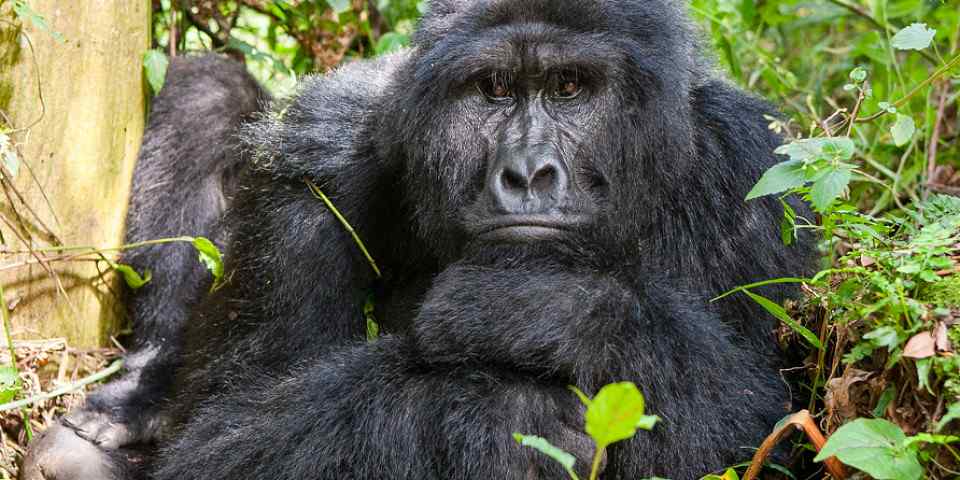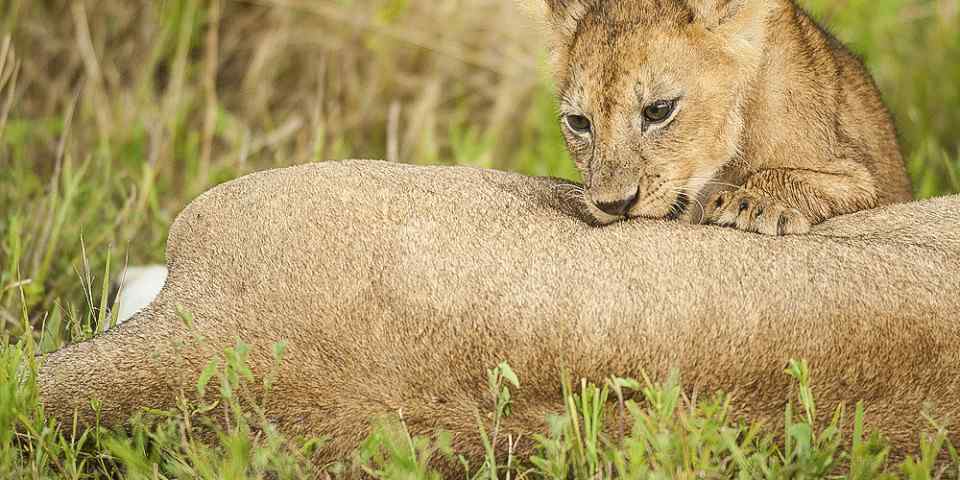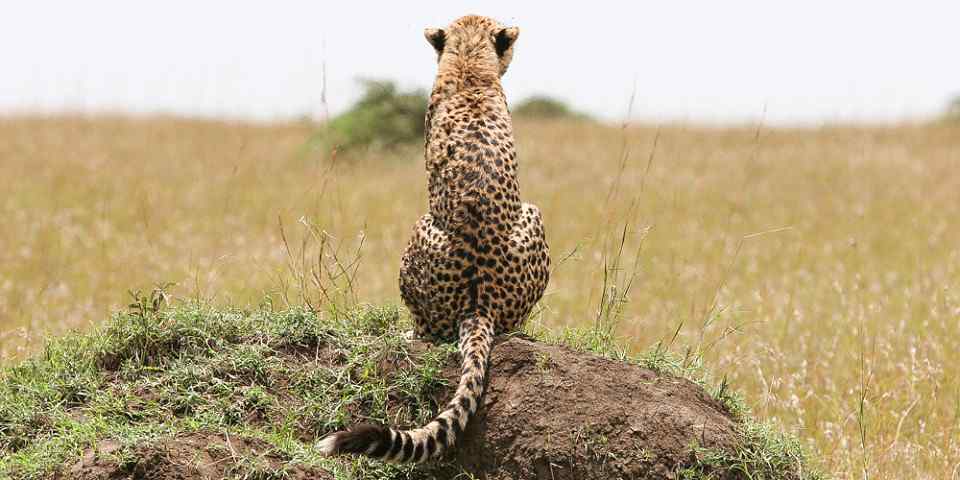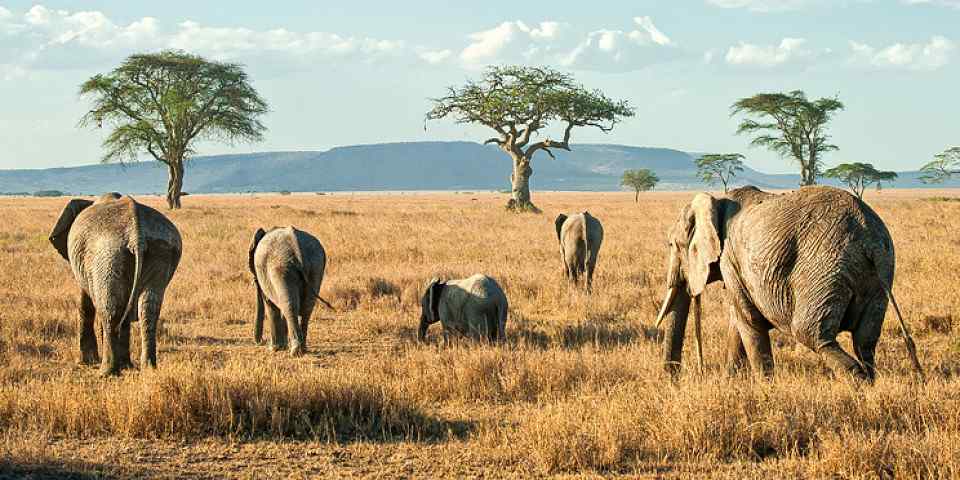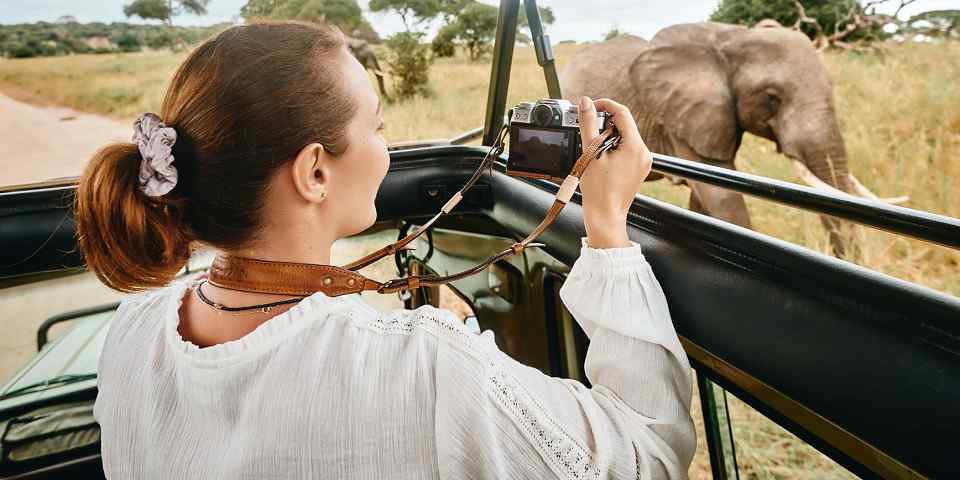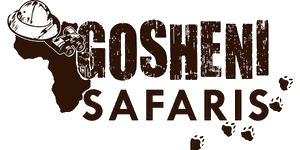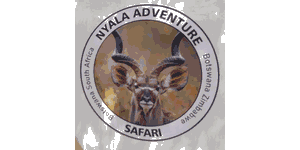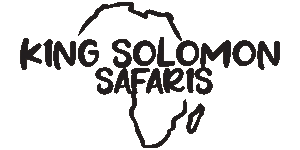Tour Length
Rates in USD $ – Change Currency
Per person, excl. international flightsOperator Rating
Other Tour Features
Filter by Operator
Filter by Accommodation
African Camping Safaris
Whether you love camping or you’re just looking at keeping the price of your safari down, a camping safari might be the right choice for you. A good operator will provide a comfortable set-up with high-quality tents, a dining tent, campfire, great food and minimal hassle. It’s the best way to soak up the safari ambience and to feel part of nature. There is no better way to end the day in the bush than sitting around a fire under the stars, recounting the highlights of the day. Camping is also great for bonding with your family or other people on the tour, or with the support crew facilitating your safari, such as the driver and guide.
-
Top Rated Operator

11-Day Enjoy Wildlife Safari and Whale Shark Tour
$3,124 pp (USD)
Tanzania: Private tourBudgetCamping & Lodge
You Visit: Arusha (Start), Tarangire NP, Serengeti NP, Southern Serengeti NP, Ngorongoro Crater, Lake Natron, Dar es Salaam (City), Mafia Island (End)

Colours Africa Tours and Safaris
5.0/5 – 205 Reviews
-

3-Day Private Camping Safari to Serengeti & Ngorongoro
$983 pp (USD)
Tanzania: Private tourBudgetCamping
You Visit: Arusha (Start), Serengeti NP, Ngorongoro Highlands, Ngorongoro Crater, Arusha (End)

Lekobe Adventures Safaris
4.9/5 – 51 Reviews
-

3-Day Low Budget Safari to Tanzania
$660 pp (USD)
Tanzania: Shared tour (max 6 people per vehicle)BudgetCamping
You Visit: Arusha (Start), Tarangire NP, Ngorongoro Crater, Lake Manyara NP, Arusha (End)

EATL Tour Company
5.0/5 – 12 Reviews
-
Best Seller

7-Day Amboseli Lake Nakuru and Maasai Mara 2025
$1,815 to $2,558 pp (USD)
Kenya: Private tour
Mid-range Camping & Tented CampYou Visit: Nairobi (Start), Masai Mara NR, Lake Nakuru NP, Amboseli NP, Nairobi (End)

Back of Africa Adventure
5.0/5 – 85 Reviews
-
Top Rated Operator
![6-Day Serengeti Wildebeest Migration Camping Safari]()
6-Day Serengeti Wildebeest Migration Camping Safari
$1,276 pp (USD)
Tanzania: Shared tour (max 6 people per vehicle)BudgetCamping & Lodge
You Visit: Arusha (Start), Tarangire NP, Central Serengeti NP, Serengeti NP, Ngorongoro Crater, Lake Manyara NP, Arusha (End)

Meru Slopes Tours & Safaris
5.0/5 – 463 Reviews
-
![7-Day Affordable Tanzania Safari – Big Five & More]()
7-Day Affordable Tanzania Safari – Big Five & More
$1,960 pp (USD)
Tanzania: Private tourBudgetCamping & Hotel
You Visit: Arusha (Start), Arusha NP, Tarangire NP, Serengeti NP, Ngorongoro Crater, Foothills of Mt Kilimanjaro, Arusha (End)

Goldfinch Adventures
5.0/5 – 49 Reviews
-
Best Seller
![8-Day Victoria Falls, Chobe & Okavango Delta Explorer]()
8-Day Victoria Falls, Chobe & Okavango Delta Explorer
$2,728 pp (USD)
Botswana & Zimbabwe: Private tour
Mid-range Camping & LodgeYou Visit: Victoria Falls (Start), Chobe River, Chobe NP, Savuti (Chobe NP), Khwai Concession (Okavango Delta), Moremi GR (Okavango Delta), Maun Airport (End)

Moonstroll Vantage Expeditions
4.8/5 – 69 Reviews
-
![10-Day Gorillas, Chimps (Kibale) & Big 5 Wildlife Safari]()
10-Day Gorillas, Chimps (Kibale) & Big 5 Wildlife Safari
$2,949 pp (USD)
Uganda: Shared tour (max 7 people per vehicle)BudgetCamping & Lodge
You Visit: Entebbe (Start), Murchison Falls NP, Kibale NP (Chimps), Queen Elizabeth NP, Bwindi Impenetrable NP (Gorillas), Lake Mburo NP, Entebbe (End)

Big Apes Africa
5.0/5 – 116 Reviews
-
![5-Day Best of Tanzania Small Group Safari Package]()
5-Day Best of Tanzania Small Group Safari Package
$924 pp (USD)
Tanzania: Shared tour (max 6 people per vehicle)BudgetCamping & Tented Camp
You Visit: Arusha (Start), Tarangire NP, Serengeti NP, Ngorongoro Crater, Lake Manyara NP, Arusha (End)

Joagro Safaris Tanzania
4.9/5 – 55 Reviews
-
![4-Day Tarangire, Serengeti, Ngorongoro Lodge & Camping]()
4-Day Tarangire, Serengeti, Ngorongoro Lodge & Camping
$1,460 pp (USD)
Tanzania: Private tour
Mid-range Camping & LodgeYou Visit: Arusha (Start), Tarangire NP, Serengeti NP, Central Serengeti NP, Ngorongoro Crater, Arusha (End)

Nkollo Tours & Safaris
4.8/5 – 68 Reviews
-
Top Rated Operator
![3-Day Serengeti and Ngorongoro Join Tour]()
3-Day Serengeti and Ngorongoro Join Tour
$633 pp (USD)
Tanzania: Shared tour (max 6 people per vehicle)BudgetCamping
You Visit: Arusha (Start), Serengeti NP, Ngorongoro Crater, Arusha (End)

Mountain Warriors Tours and Safaris
4.9/5 – 245 Reviews
-
Top Rated Operator
![8-Day Safari with Game Drives and Cycling and Walking]()
8-Day Safari with Game Drives and Cycling and Walking
$2,420 pp (USD)
Tanzania: Private tourBudgetCamping & Hotel
You Visit: Arusha (Start), Tarangire NP, Lake Manyara NP, Serengeti NP, Ngorongoro Crater, Materuni Waterfalls (Highlight), Arusha (End)

Safari Soles
5.0/5 – 340 Reviews
-
Top Rated Operator
![7-Day Best Northern Circuit Private Camping Safari]()
7-Day Best Northern Circuit Private Camping Safari
$1,815 pp (USD)
Tanzania: Private tourBudgetCamping & Hotel
You Visit: Arusha (Start), Materuni Waterfalls (Highlight), Tarangire NP, Serengeti NP, Ngorongoro Crater, Arusha (End)

Serengeti Wakanda Tours and Safaris
5.0/5 – 623 Reviews
-
![6-Day Dream Journey Experience – Tanzania Iconic Parks]()
6-Day Dream Journey Experience – Tanzania Iconic Parks
$1,804 pp (USD)
Tanzania: Private tourBudgetCamping & Lodge
You Visit: Arusha (Start), Tarangire NP, Serengeti NP, Central Serengeti NP, Ngorongoro Crater, Lake Manyara NP, Arusha (End)

See Endless Adventures Tanzania
5.0/5 – 54 Reviews
-
Top Rated Operator
![5-Day Tanzania Safari Budget Tour]()
5-Day Tanzania Safari Budget Tour
$1,869 pp (USD)
Tanzania: Shared tour (max 6 people per vehicle)BudgetCamping
You Visit: Arusha (Start), Lake Manyara NP, Serengeti NP, Ngorongoro Crater, Arusha (End)

Gosheni Safaris Africa
5.0/5 – 477 Reviews
-
![10-Day Botswana Mobile Safari-Explore Africa]()
10-Day Botswana Mobile Safari-Explore Africa
$5,357 pp (USD)
Botswana: Private tour
Mid-range CampingYou Visit: Maun (Start), Moremi GR (Okavango Delta), Khwai Concession (Okavango Delta), Chobe NP, Chobe Riverfront (Chobe NP), Kasane Airport (End)

Nyala Mobile Safaris
5.0/5 – 8 Reviews
-
![4-Day Great Camping Tour]()
4-Day Great Camping Tour
$1,540 pp (USD)
Tanzania: Private tourBudgetCamping
You Visit: Arusha (Start), Tarangire NP, Serengeti NP, Ngorongoro Highlands, Ngorongoro Crater, Moshi (End)

Kwesa Tours
5.0/5 – 103 Reviews
-
![10-Day Private Tanzania Wildlife and Cultural Experience]()
10-Day Private Tanzania Wildlife and Cultural Experience
$4,675 pp (USD)
Tanzania: Private tourBudgetCamping & Lodge
You Visit: Arusha (Start), Materuni Waterfalls (Highlight), Ngorongoro Crater, Serengeti NP, Lake Eyasi, Mto wa Mbu (Town), Arusha NP, Foothills of Mt Meru (Area), Arusha (End)

Good One Tours
5.0/5 – 44 Reviews
-
![6-Day Tanzania Camp Safar Ngorongoro Serengeti Tarangire]()
6-Day Tanzania Camp Safar Ngorongoro Serengeti Tarangire
$2,013 to $2,123 pp (USD)
Tanzania: Private tourBudgetCamping
You Visit: Arusha (Start), Lake Manyara NP, Serengeti NP, Ngorongoro Crater, Tarangire NP, Arusha (End)

King Solomon Safaris
5.0/5 – 51 Reviews
-
![5-Day Group Safari, Camping Marvel]()
5-Day Group Safari, Camping Marvel
$1,155 pp (USD)
Tanzania: Shared tour (max 6 people per vehicle)BudgetCamping & Hotel
You Visit: Moshi (Start), Tarangire NP, Serengeti NP, Ngorongoro Crater, Lake Manyara NP, Moshi (End)

Spirit of Kilimanjaro and Safari
5.0/5 – 78 Reviews
6 Questions About Camping Safari Tours

Answered by
Ariadne van Zandbergen
Ariadne is a renowned African wildlife photographer whose work is featured in many well-known guidebooks and magazines. She loves camping as it usually brings her close to the action. Campsites are often the best places to photograph wildlife – otherwise shy animals become habituated to people there.› More about Ariadne
6 Questions About Camping Safari Tours
 Ariadne van Zandbergen
Ariadne van Zandbergen
Why should I choose an African camping safari?
“Safaris tend to be quite expensive and camping is a great way to save costs. For a variety of reasons, including remote locations and limited availability, most lodges in the national parks are very expensive. If you’re on a budget, you’ll probably have to compromise and take lodgings outside the park, or even in a nearby town. Campsites in the parks are usually in fabulous locations. Staying in the heart of the action, having dinner around a fire at night and listening to animal noises from your tent all add to the overall experience. Camping isn’t everybody’s cup of tea but for those who don’t mind roughing it a bit, camping might be a very good option for your safari. Many reputable operators offer very nice camping set-ups. And you might be pleasantly surprised by the comfort level, food and general facilities in a camp. ”
1What sort of tents will I be sleeping in?
“Reputable tour operators offer camping safaris in high-quality tents with strong canvas and good zips. There are lots of different designs and sizes available, so ask your operator for the specifics. Tents are usually big enough for two small camping beds and a bit of space for your bag, but not much else. This is because a camping safari requires tents that can easily be put up and taken down. Beds and bedding are usually provided.”
2Is staying in a tent safe around wild animals?
“It is safe to stay in a tent with wild animals around as long as you adhere to a few sensible precautions. You will be briefed on how to behave, and there is nothing to worry about as long as you stay inside your tent. It is vital to make sure your tent is securely zipped up at night. Don’t keep any food inside your tent (especially strong-smelling fruit such as oranges, which might interest elephants). Many campsites in African national parks are unfenced and animals roam freely around the tents. Usually the grass is cut short in the entire campsite, so animals are easily seen. They tend to keep their distance during daytime, but they might well come through camp when it is quiet at night.”
3Do I have to help with camp chores?
“Whether or not you are expected to help with camp chores is usually clearly indicated in the tour itinerary. On most custom-made camping tours, the guide and cook will take care of anything. However, it is common on overland tours (and some budget camping tours) that clients have to set up their own tent. They also have to do other chores, such as unloading the vehicle and helping with meals. On a walking safari, all equipment is usually brought to the site in a back-up vehicle. On mountain climbs, such as Mount Kilimanjaro, porters are hired to carry tents and other camping gear. You will only need to carry your own daypack and water. If you opt for a self-drive camping safari, you’ll have to do all chores yourself.”
4What does a typical day look like on a camping trip?
“A typical day on a camping safari in a savannah reserve usually starts with a wake-up call before sunrise. After a quick cup of coffee, you’ll be on your way to look for predator action. Mid-morning, you might come back to the campsite for brunch. You’ll get some time to rest during the midday heat. Then you’ll go out again wildlife viewing on an afternoon drive, or maybe a boat trip. Other days, you might take a packed lunch with you and spend a full day out to be able to reach areas further away from base camp. On a camping safari, you’ll most likely be driving a circuit of parks and reserves in one country. You’ll set up camp in, or outside, the parks as a base for game drives. The schedule tends to be tight as time is usually limited to a safari of four to seven days. There will be days viewing wildlife in the parks and days driving between parks. The roads are often bumpy and driving times can be long. Luckily, there is always lots to see along the way.”
5How much will an African camping safari cost?
“Typically, a budget camping safari will cost around US$175 to US$250 per person per day. Some countries, such as Tanzania and Botswana, tend to be more expensive and the cost of a safari is around US$275 to US$350 per person per day. There are however many variables to consider when costing a safari. For example, the timing of your trip can have an effect on safari costs as low- or high-season rates may apply. The level of luxury of the camping experience, and whether you join a group tour or opt for a private safari, will also make a big difference to the price. There are also usually some ‘hidden’ costs on a safari, such as tips for rangers and guides, fees for optional activities and drinks. Please be aware that tips for the guide can add up. A general guideline is US$10 to US$15 per person per day. On most safaris the parks fees, accommodation, transport, tour guide and three meals per day are included. Make sure to read the fine print on any safari packages offered. Also, get clarification in writing from your operator on any queries that arise, as well as a run-down on any potential ‘extras’. Still, given an organized safari is usually not cheap, camping is a great way to reduce costs. If you don’t mind the basic facilities, camping brings you closer to nature and enhances the safari experience.”
6
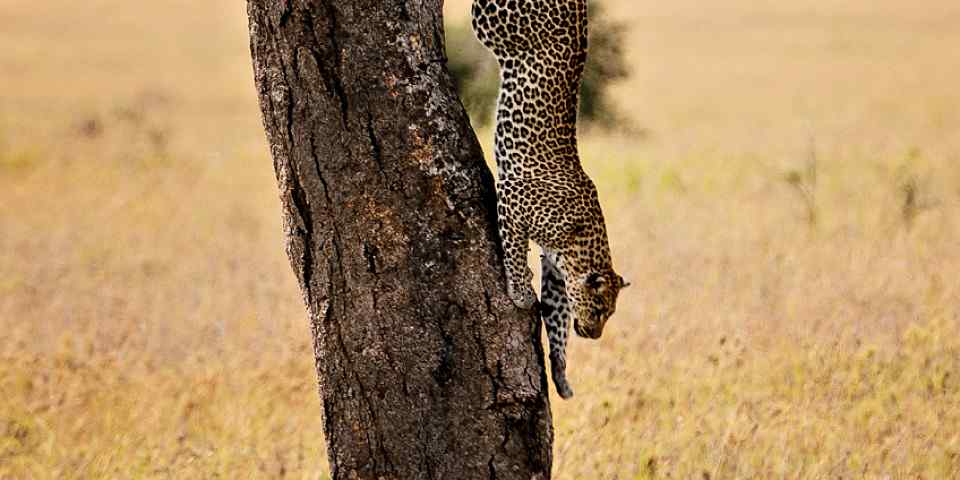
_1813_5e20b935b89f3.gif)




